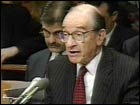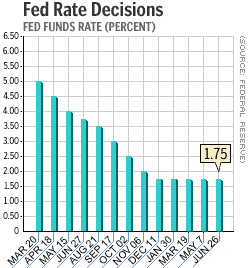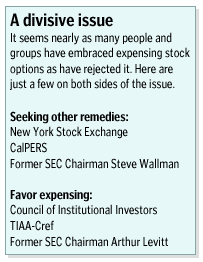
NEW YORK (CNN/Money) -
Federal Reserve Chairman Alan Greenspan expressed optimism Tuesday about the health of the U.S. economy, but acknowledged that corporate scandals had indirectly hurt business spending and called for tougher penalties for CEOs who break the law.
His words seemed to have a positive effect on Wall Street -- which probably hung on his words even more than it usually does -- amid a stubbornly bearish market ruled by fears about corporate accounting.
"The U.S. economy appears to have withstood a set of blows -- major declines in equity markets, a sharp retrenchment in investment spending, and the tragic terrorist attacks of last September -- that in previous business cycles almost surely would have induced a severe contraction," Greenspan said in his remarks to lawmakers.
| 
| |

| 
| 
|

|
 CNNfn's Kathleen Hays takes a closer look at Greenspan's upbeat view of the U.S. economy. CNNfn's Kathleen Hays takes a closer look at Greenspan's upbeat view of the U.S. economy.
|
|
 Play video
Play video
|
| 
|

|
|
The central bank chairman said inflation was low, consumer spending had held up well through the downturn, housing-market strength was likely to continue and businesses appeared to have unloaded their glut of inventories, setting the stage for a rebound in production.
"This is as upbeat a testimony as could reasonably have been hoped for," Ian Shepherdson, chief U.S. economist at High Frequency Economics Ltd., said in a note.

Greenspan's words brought a ray of sunshine to the gloomy U.S. stock market; the Nasdaq turned slightly higher as he spoke, and the Dow Jones industrial average won back most of its earlier losses.
But in his semi-annual report on monetary policy to the Senate Banking, Housing, and Urban Affairs Committee, Greenspan also pointed out several uncertainties, including the likely prospect of more scandalous revelations, which could fuel more weakness in stock prices.
"Spending will continue to adjust for some time to the declines that have occurred in equity prices," he said, something that is hampering the strength of the overall economy.
Still, Greenspan said, while business managers were cautious, their spending was likely to improve this year, though slowly and unevenly in some areas, boosted by rising profits, low interest rates and high productivity.
And, while consumers were unlikely to go on any big shopping sprees after maintaining a steady level of spending throughout the economic downturn, Greenspan said they also did not seem to have "retrenched." That's good news, since consumer spending fuels about two-thirds of the U.S. economy.
Greenspan said the Fed expected gross domestic product (GDP), the broadest measure of the nation's economy, to grow 3.5 to 3.75 percent this year and between 3.5 and 4 percent in 2003. The central bank expects unemployment to fall to between 5.25 percent and 5.5 percent by the end of 2003 from 5.9 percent in June.
With inflation low and uncertainties high, Greenspan hinted the Fed was likely to keep its target for a key short-term interest rate low until the economic recovery seemed more stable, which many economists think may not happen until next year.
The economy has bounced back from the recession that began in March 2001, which was probably one of the mildest on record, growing at a rapid -- and probably unsustainable -- 6.1 percent rate in the first quarter, yet the Fed has kept rates low following 11 cuts last year.
Greenspan warned that the growing federal budget deficit could slow economic growth. In similar testimony last year, Greenspan supported a tax cut, proposed by President Bush and passed by Congress, that helped erase the federal budget surplus.
The buck stops with the CEOs
Somewhat unexpectedly, Greenspan also directly addressed the rash of corporate scandals, including those at Enron Corp. and WorldCom, that have sapped investor confidence and driven stocks lower.
Echoing statements made in recent speeches by President Bush, Greenspan described recent corporate scandals as a sort of "hangover" to the excesses of the late 1990s, focusing much of the blame on CEOs who seemed more interested in improving the value of their stock options than in building shareholder value.
"An infectious greed seemed to grip much of our business community," he said.
Greenspan called for tougher penalties for rule-breaking CEOs and appeared to support CEO certification of financial statements, saying CEOs "must bear the responsibility to accurately report" their companies' finances.
He called for better funding for the Securities and Exchange Commission and generally for reforming regulation of accounting and corporate governance -- but he also said such reform needed to be flexible enough to adapt to changes in the financial system.
Greenspan praised the legislation, sponsored by Sen. Paul Sarbanes, D-Md., and passed Monday by the Senate, to reform corporate accounting and governance, while warning that he did not feel qualified to address the specific components of the bill.
"I thought that the initiative that the Senate produced was very important and very effective," said Greenspan, who also reversed course and supported government regulation of the accounting industry -- previously, he said he preferred to leave that to the private sector.
Support for expensing stock options?
Greenspan also seemed to offer support for the idea of companies listing the stock options they offer as compensation as an expense. Currently, companies are only required to estimate the impact of their issuance of stock options in footnotes to their financial statements.

Some investor groups have called for companies to list the options they give as compensation as an expense. Businesses have strenuously resisted this change, saying it's impossible to estimate the cost of unexercised options. Some analysts have pointed out that some companies' earnings would be severely impacted by a requirement to expense options.
Ironically, however, Greenspan said he though expensing stock options would actually help companies report greater earnings growth, especially since they have given out fewer options recently than during the stock-market bubble of the late 1990s.
He did not think, however, that it would be necessary for Congress to mandate that companies expense options. Instead, he thought companies would slowly start doing it voluntarily, as Coca-Cola Co. (KO: down $1.63 to $50.37, Research, Estimates) announced on Monday that it was doing.
Greenspan held up as an example of a desirable model for earnings reports the profit calculations of the Commerce Department for the National Income and Product Accounts. This measure, he pointed out, excludes several one-time items ordinarily reported as earnings and also expenses stock options when they are exercised.
"Although this treatment of the cost of options is not ideal, it is arguably superior to their treatment in shareholder reports, where options are generally not expensed at all," Greenspan said.

|

